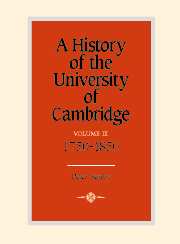Book contents
- Frontmatter
- Contents
- List of illustrations
- General Editor's preface
- Acknowledgements
- List of abbreviations
- Introduction
- 1 Townscape and university: topographical change
- 2 The university: its constitution, personnel, and tasks
- 3 Colleges: buildings, masters, and fellows
- 4 Colleges: tutors, bursars, and money
- 5 Mathematics, law, and medicine
- 6 Science and other studies
- 7 Religion in the university: its rituals and significance
- 8 The Orthodox and Latitudinarian traditions, 1700–1800
- 9 Cambridge religion 1780–1840: Evangelicalism
- 10 Cambridge religion: the mid-Victorian years
- 11 The university as a political institution, 1750–1815
- 12 The background to university reform, 1830–1850
- 13 Cambridge and reform, 1815–1870
- 14 The Graham Commission and its aftermath
- 15 The undergraduate experience, I: Philip Yorke and the Wordsworths
- 16 The undergraduate experience, II: Charles Astor Bristed and William Everett
- 17 The undergraduate experience, III: William Thomson
- 18 Games for gownsmen: walking, athletics, boating, and ball games
- 19 Leisure for town and gown: music, debating, and drama
- Appendices
- Bibliography
- Index
19 - Leisure for town and gown: music, debating, and drama
Published online by Cambridge University Press: 05 April 2012
- Frontmatter
- Contents
- List of illustrations
- General Editor's preface
- Acknowledgements
- List of abbreviations
- Introduction
- 1 Townscape and university: topographical change
- 2 The university: its constitution, personnel, and tasks
- 3 Colleges: buildings, masters, and fellows
- 4 Colleges: tutors, bursars, and money
- 5 Mathematics, law, and medicine
- 6 Science and other studies
- 7 Religion in the university: its rituals and significance
- 8 The Orthodox and Latitudinarian traditions, 1700–1800
- 9 Cambridge religion 1780–1840: Evangelicalism
- 10 Cambridge religion: the mid-Victorian years
- 11 The university as a political institution, 1750–1815
- 12 The background to university reform, 1830–1850
- 13 Cambridge and reform, 1815–1870
- 14 The Graham Commission and its aftermath
- 15 The undergraduate experience, I: Philip Yorke and the Wordsworths
- 16 The undergraduate experience, II: Charles Astor Bristed and William Everett
- 17 The undergraduate experience, III: William Thomson
- 18 Games for gownsmen: walking, athletics, boating, and ball games
- 19 Leisure for town and gown: music, debating, and drama
- Appendices
- Bibliography
- Index
Summary
MUSIC
MUSIC 1760–1832
On Sunday 12 March 1843 William Thomson wrote in his diary that ‘after hall, I went over to practising along with Airey, & played the Canadian Boatsong as a duetto’. Thomson was playing a ‘cornopean’, as the cornet-was at first called; the instrument, essentially a valved version of the posthorn, had been invented in France about fifteen years earlier, reaching Britain about 1834. The cornet was characteristic of the improvement in instruments that occurred between 1700 and 1850 and accompanied the extension of interest in music, as a leisure pursuit, to large numbers in the middle and working classes. This was a striking cultural phenomenon of the epoch, akin to the spread of literacy and a taste for books. Cambridge – town and gown – participated in it, and as we shall see William Thomson was a notable figure within it.
Music had for long been established in the Cambridge syllabus, but was as an academic subject disparaged and despised by dons for whom it was a cherished leisure pursuit. (Something similar was later to happen with English literature.) Winstanley describes it as the ‘Cinderella among the faculties’, and points out that early in the nineteenth century it was said that ‘this faculty does not form part of the University and has only a slight connexion with it’. Neither doctors nor bachelors of music were members of the Senate.
- Type
- Chapter
- Information
- A History of the University of Cambridge , pp. 681 - 724Publisher: Cambridge University PressPrint publication year: 1997

